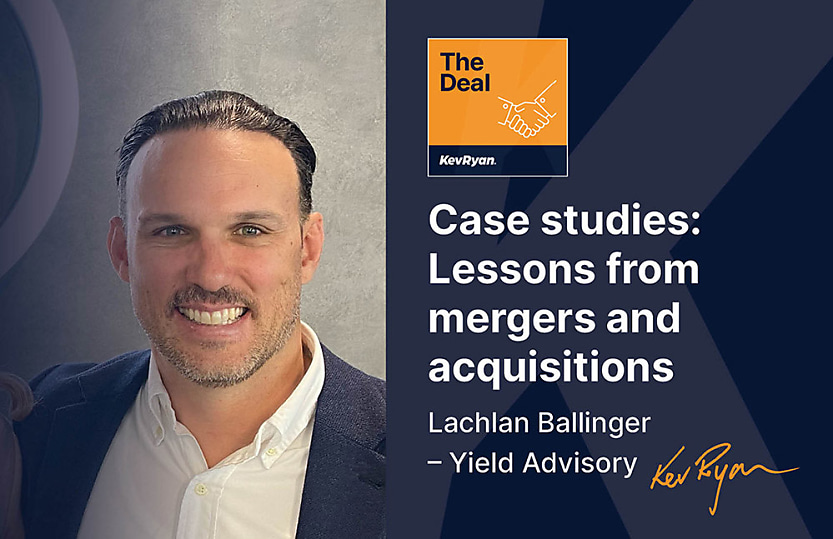Case studies: How I bought/sold my accounting business

Buying or selling an accounting firm is never simple. But with the right advice, it should be smooth and successful for all stakeholders.
Long before the merger between his business, Yield Advisory, and Focus Professional Group, Lachlan Ballinger had plans for growth.
When the time came to pull the trigger on a merger, Yield Advisory was well established in the Maroochydore CBD. Ballinger was looking to bolster his firm’s footprint in the Sunshine Coast region.
“My wife and I were founders of the business and we commuted to Brisbane from the Sunshine Coast for a long time,” Ballinger says.
“We always wanted to create a strategic partnership or acquisition, and that was the conversation I had with Kev Ryan, about finding a great local operator that had been on the Sunshine Coast for a long time.”
Ryan introduced Ballinger to a number of firms, including Focus Professional Group.
“Kev was the facilitator, and we had a number of boardroom strategy meetings, as well as coffees and lunches with Allen Hertel, the owner of Focus Professional Group and a very impressive guy,” Ballinger says.
“That’s how we landed on that particular firm, but that was just the beginning.”
No two acquisitions are the same
Ryan says patience with, and trust in, the buying and selling process will overcome the many challenges of making a good match
And while there is a proper process to follow, it’s vital to recognise that there is no such thing as a one-size-fits-all solution.
“Every transaction has its own peculiarities, especially mergers,” Ryan says. “The individual requirements of each party must be respected. You can’t template or rush transaction advisory.”
Just as accountants regularly advise their clients on process, it’s important that they also seek expert advice on what’s required in selling or buying a firm.
“We’re constantly talking to our clients about following the proper purchase process of undertaking thorough due diligence,” Ballinger says. “So, it was good for us to do that ourselves, to get that experience and find out exactly how it works.”
Keep a clear focus on your staff
Whether buying or selling, says Maurice Sucevic, whose accounting business BuildGrowth formed a joint venture with Guild Group under the guidance of Kev Ryan, there are several balls to keep in the air during the process.
One is the engagement level of your staff.
“Clients still know I’m here, taking their calls,” Sucevic says. “That mitigates risk for the Guild Group and frees up my time to continue to build my business, which adds value for them and for me.”
“They’re also bringing my staff on board … and good people are very hard to find in this market.”
Ballinger agrees, saying it’s the people in the business, as well as the owner, who have relationships with clients.
“It’s really important that they’re all looked after during this period of change and uncertainty,” he says. “When considering the merger, I had to put my team and our clients at the centre of my focus.”
Of course, clear and well-timed communication with clients is essential. Sucevic organised face-to-face meetings with key clients to let them know what was going on.
Ballinger was similarly attentive of his client base and that of the business he was merging with, ensuring their experience was not damaged in any way by what was going on in the background.
“When you’re buying an accounting firm, you have to understand that it’s all about relationships,” Ballinger says.
“We’re not selling products, we’re selling relationships. So you need to make sure the process is fairly seamless for owners, staff and clients. That’s what I really appreciated about Kev – he was able to make the process really smooth.”
Ensure the business can run without you
What systems are in place, and what processes and procedures have been agreed, within your business?
Of course, this relates to software platforms such as Xero and Ignition. But it’s also about whether the business can continue to run smoothly and profitably in the owner’s absence.
The BuildGrowth firm was in good shape for a sale to a joint venture partner thanks to the fact that Sucevic had built the business around a single software package. This was partly the result of some excellent advice he’d received from Kev Ryan years earlier.
When they’d met, Sucevic had spoken with Ryan about how to prepare a business for sale. They’d discussed the importance of workflow systems and procedures, meaning the business can continue to operate with or without its founder.
Importantly, the business software Sucevic had used also provided years of reliable and consistent revenue data. This made the purchase decision – for 60% of BuildGrowth – a relatively safe and simple one for the joint venture partner.
Data matters in an accounting firm transaction
“Buyers are looking for businesses that can report clean and consistent data, not only in the actual reporting of the business's performance and things like client payment history, but easily interpreted work paper history,” Ryan says.
And so, it’s important that a vendor gets their systems collecting data properly in the lead up to a sale. The new owner must have the ability to quickly pick up the clients’ history and understand their story.
“This makes the transition, the client hand over, easier,” Ryan says. “I can’t sell goodwill if it’s locked between the vendor’s ears.”
Buying and selling accounting firms doesn’t have to be risky, he says. Just engage an experienced transaction advisor – not a practice broker or an accounting recruiter – take your time, look for the correct fit and aim for a good deal for both parties.
“If it’s a ‘great deal’ for one side, it’s not so great for the other,” Ryan says. “That jeopardises the sustainable outcome the KevRyan shop strives for.”
